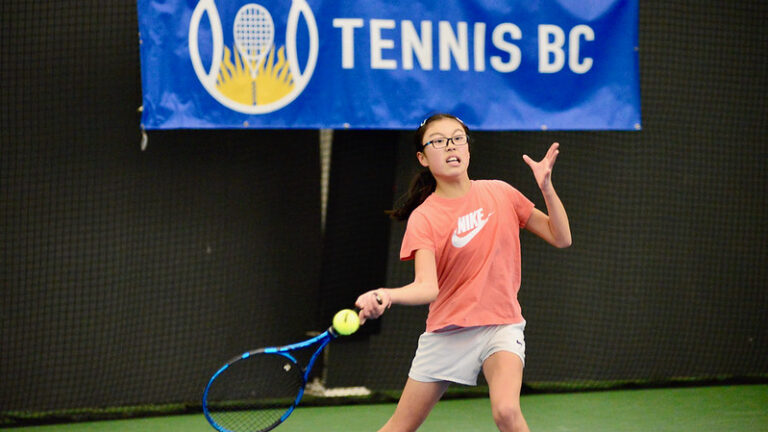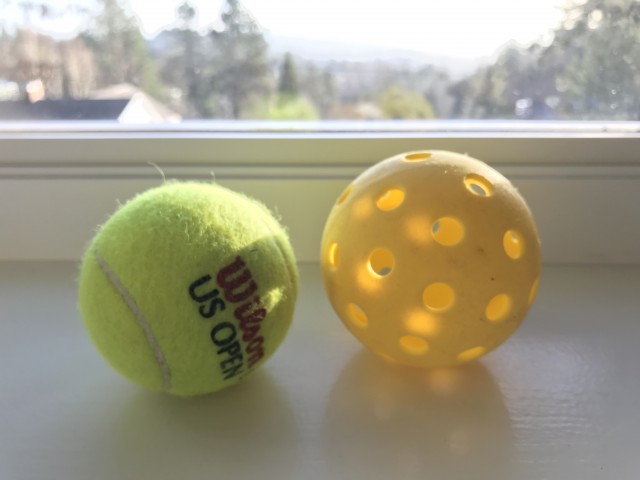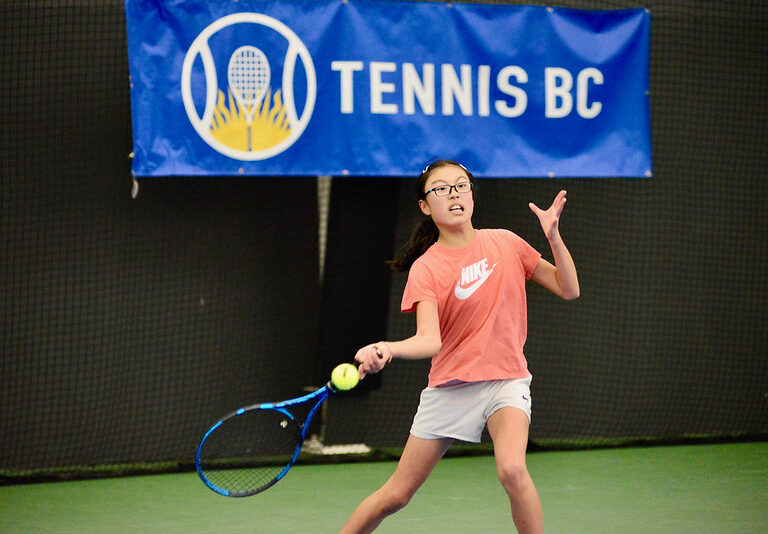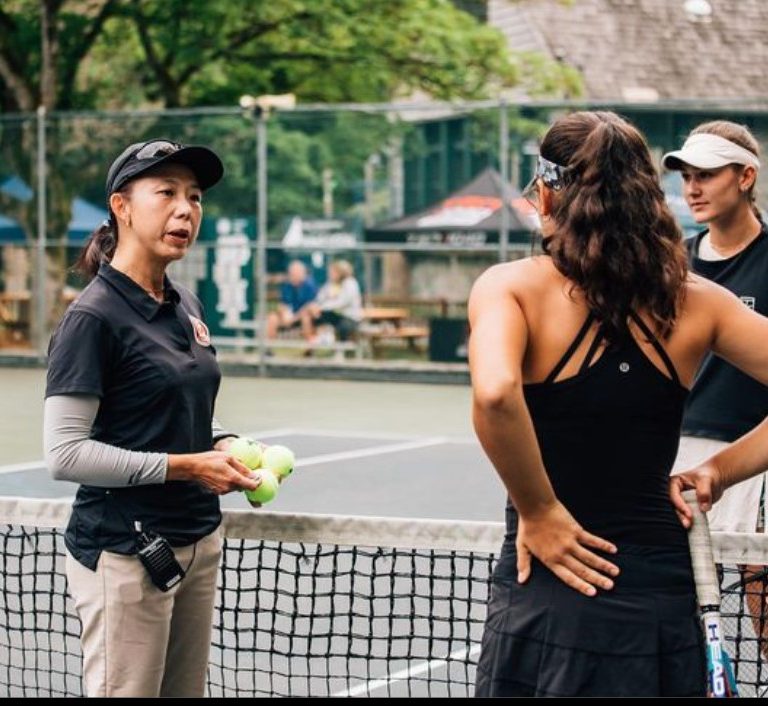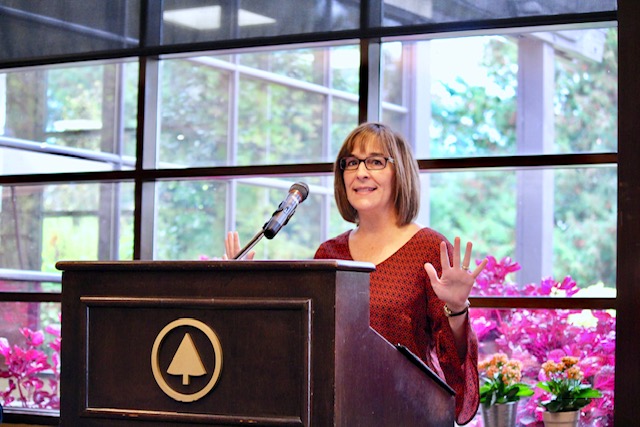
Shaughnessy Golf & Country Club – The keynote speaker at the 2018 Tennis BC Annual General Meeting was Karen Shaver, Director of Safe Sport at Tennis Canada. This appointment and creation of a safe sport department and mandate was Tennis Canada’s reaffirmation of its commitment to safeguarding the sport of tennis. In her role, Ms. Shaver will oversee the modernization and strengthening of safe sport policies across the federation, including the development and promotion of online resources and tool-kits promoting safe sport participation for recreational players of all ages, athletes, coaches, instructors, officials, volunteers and parents. This appointment is also connected to the TPA’s recent announcement that all TPA members will now require mandatory background checks.
Ms. Shaver’s presentation was very powerful and brought to light the importance of implementing safe sport policies in this area, and above all else, educating our community about keeping our sport safe.
In today’s landscape, allegations and scandals in sport overall are growing in number, in scope and in impact. Examples of this include the Penn State Abuse scandal, Gymnastics USA, Alpine Skiing, Lawn Tennis, Hockey Canada and more. Abuse can be and is not limited to: physical, sexual, emotional, yelling, using exercise as punishment, touching and rape. The number of incidents of self-produced child porn and forcing children to assault children are growing:
- 1 in 3 girls and 1 in 5 boys will be sexually assaulted by the time they are 18
- 90% of time they will be assaulted by someone they know (teacher, family, friend, coach, etc.)
- 1 in 3 to 2 in 3 times the assaults are committed by a young person
- 75-90% of the time assaults are unreported
It’s not unusual for the perpetrator to have 100s of victims before a first report. How do these things happen in tennis? Tennis has many factors that mitigate or elevate the potential harm. In tennis three factors elevate the risk of harm:
- relationships
- access
- current attitude
Relationships between coaches and/or trainers and players are often long-term. It is commonly said in the tennis industry that abuse does not happen in tennis, it happens only in other sports (this is false).
The Safe Sport Approach
In order to prevent these incidents, we need to prioritize high risk activities and environments, such as traveling coaches and billet families and prioritize what is within our control as organizations and clubs. Tennis Canada will be proactively sharing materials, policies and protocols with Tennis BC, and we will then together disseminate this information to our communities.
How to Respond
You are watching for children who change their behaviour rather suddenly: children that are usually happy and outgoing that used to practice and want to hang out, and suddenly do not want to do these things (this is behaviour that indicates something may have happened). Other behaviours may include: a child starts to skip school or practice, starts to drink, cutting, angry, sad, sullen, no energy, or don’t want to participate anymore.
If a child discloses to you:
- Listen to the child.
- Tell the child who must be notified.
- Reassure the child that the conduct described is not the child’s fault and that the child has done the right thing by disclosing.
- Speak to the child in private.
- Determine the immediate safety needs of the child.
- Do not judge.
- Do not lead or suggest answers to the child.
- Do not return the child to a risky situation.
- Do not blame them for what happened (such as questioning why they were where they were, etc.).
- Do not promise to remain silent.
- Do not bring the suspected perpetrator to confront the child.
- Do not intervene with the alleged offender causing a contamination of a potential future investigation.
Children will disclose in increments prior to trusting you more (i.e. “I feel uncomfortable”; “I don’t want to work with that coach”; they are testing you and whether you can be trusted, do not become angry).
You have a legal duty to report in BC
In BC, you have a legal duty to report if you have any reason to think there is child or youth that has been abused or neglected. Do not report to your boss. You report to this number: 1-800-663-9122 or call 9-1-1 in immediate danger.
A lack of reporting may lead to a financial penalty and/or jail time.
What else can you do?
- Assess the risks associated with different positions. For example: when a roving umpire goes to the bathroom with a junior tennis player when the player needs to leave the court during a match (or similar situations). This is a very risky situation. A possible solution to this is sending two people who go with the child or this practice should be eliminated all together. These are the types of situations that Tennis Canada is currently re-assessing.
- Locations pose risks as well, i.e. courts with no lights at night.
- Look at your policies and identify gaps; look at your insurance policies, sport payouts are super high these days.
- Look at activities and assess, adjust the risks.
- Screen everyone; make the environment of tennis much safer.
The first step in the process of making our sport safer for everyone begins with our mentality: acknowledging that unfortunately this does happen in tennis and we need to take effective steps to change this. The next step is taking responsibility as coaches, parents, players, clubs, volunteers and members of our tennis community to educate ourselves on what the signs and symptoms of abuse are, what are the safest and most effective steps we can take to solve an issue, and how we can prevent these incidents in the first place.
Tennis BC would like to extend a big thank you to Karen Shaver for attending and speaking at our AGM last month. Please stay tuned for more information and resources regarding this crucial topic.
More Information and Resources
- Safe Sport web pages on Tennis Canada site
- Contact safesport@tenniscanada.com
- PREVnet
- National Centre for Missing and Exploited Children (Safe to Compete)
- Lawn Tennis Association
- Canadian Centre for Child Protection
- Respect in Sport
- Safe Sport USA
